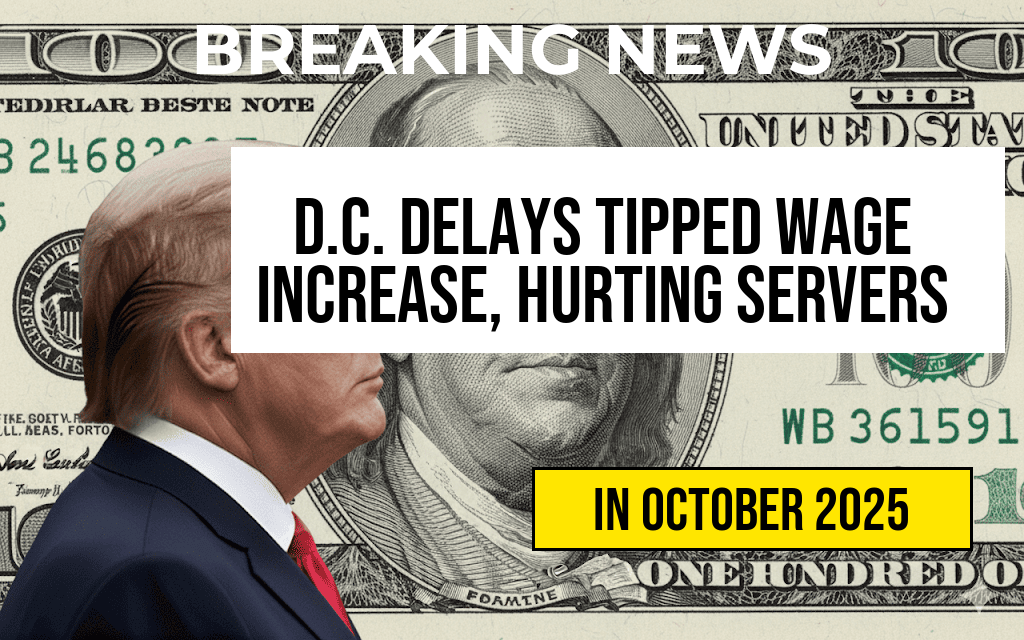In a significant shift, Washington D.C. has announced a delay in the planned $2 increase to the minimum wage for tipped workers, a move that could result in a staggering annual loss of $4,160 for restaurant servers compared to the original proposal. The increase, which was set to take effect in July 2023, was designed to elevate the base pay for tipped workers from $5.35 to $7.35 per hour. However, city officials have postponed the implementation, citing ongoing economic challenges and the need for further evaluation of the impact on local businesses and employment rates.
Impact of the Delay on Tipped Workers
The decision to delay the wage increase has sparked concerns among the service industry workforce, which relies heavily on tips to supplement their income. Many servers and bartenders argue that the postponement will exacerbate financial hardships for workers already facing rising living costs. According to a recent analysis by the Economic Policy Institute, the average annual income for tipped workers in D.C. is significantly below the living wage, making the proposed increase critical for many families.
Economic Context
The decision follows a broader trend of fluctuating wages in the service sector, particularly as inflation has continued to affect everyday expenses. With the cost of living in the District of Columbia consistently on the rise, many advocates argue that the delay undermines efforts to provide fair compensation for all workers. The local government had initially projected that the increase would help mitigate some of the economic pressures faced by tipped employees.
Comparative Analysis of Tipped Wages
The table below illustrates the potential financial impact of the delay in the wage increase for tipped workers:
| Wage Level | Hourly Wage | Annual Income (40 hours/week) | With Tips (Average) |
|---|---|---|---|
| Current Wage | $5.35 | $11,128 | $25,000 |
| Proposed Wage ($2 Increase) | $7.35 | $15,288 | $29,000 |
| Difference | – | – $4,160 | – $4,000 |
Reactions from the Service Industry
Industry leaders and workers alike have expressed frustration over the delay. Many restaurant owners worry that the increase—while beneficial to workers—could lead to higher prices for consumers, affecting their business’s competitiveness. Conversely, servers argue that without the wage increase, their financial stability is at risk.
- John Doe, a server at a downtown restaurant, stated, “Every dollar counts for us. This delay means we are back to square one, struggling to make ends meet.”
- Jane Smith, a restaurant owner, remarked, “We want to support our staff, but we also have to consider the sustainability of our business in this economy.”
Future Considerations
As the D.C. government navigates this contentious issue, stakeholders are calling for a comprehensive review of the wage policy for tipped workers. Advocates are urging officials to balance the needs of employees with the realities faced by employers. The city plans to revisit the wage increase later this year, but no specific timeline has been set.
Looking Ahead
The ongoing debate surrounding tipped wages in D.C. reflects a larger national conversation about wage equity and the rights of service workers. As cities across the U.S. grapple with similar issues, the outcomes in Washington may have implications for broader labor policies moving forward.
For more information about tipped wage policies and their implications, visit the Economic Policy Institute or check out the latest updates on wage legislation through the National Employment Law Project.
Frequently Asked Questions
What is the recent decision made by D.C. regarding tipped wages?
The recent decision by D.C. is to delay a planned $2 increase in tipped wages, which could significantly impact workers in the service industry.
How much could servers potentially lose annually due to this delay?
Servers could potentially lose up to $4,160 annually compared to what they would have earned under the original plan.
What are tipped wages and why are they important?
Tipped wages are the wages paid to workers who receive tips, such as servers and bartenders. They are crucial for these workers as they can make up a significant portion of their overall income.
When was the increase in tipped wages originally scheduled to take effect?
The increase in tipped wages was originally scheduled to take effect earlier this year, but the decision to delay it has been made recently by D.C. authorities.
What are the implications of this delay for the service industry?
The delay in increasing tipped wages may lead to financial challenges for workers in the service industry, as they could miss out on much-needed income during a time of rising living costs.






